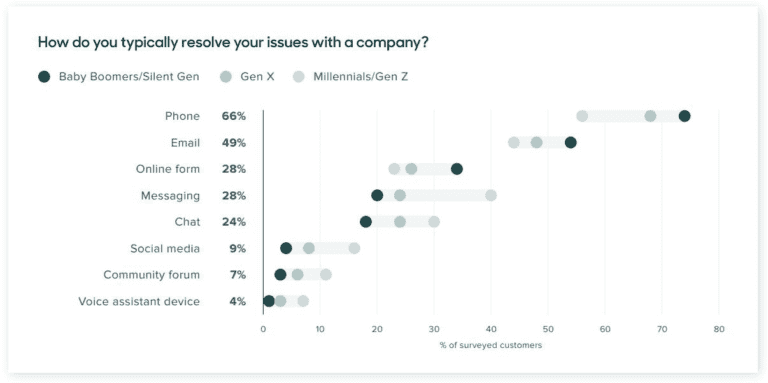Call Management: What is Call Management and How Can it Help Your Business

- February 17, 2023
Phone call communication plays a significant role in a buyer’s journey. Especially when it comes to dealing with support for a service. After all, about 66% of consumers resolve their issues over the phone.
So, it’s quite beneficial for a business to establish the right call management tools to ensure call communications run smoother.
At Myphoner, we prioritize simplifying cold-calling campaigns for businesses, so we’re going to outline how implementing a call management system will elevate your communication and customer experience.
What is Call Management?
Call management is the combination of processes and systems that an organization uses to handle incoming and outgoing calls effectively. When done well, it ensures that customers get their calls responded to in a satisfactory time and the ability to monitor the overall success of your call communications.
As we live in an increasingly digitized world, a call management system is essential for helping a business take care of and track its influx of voice calls and digital communication from customers, clients, and partners. With call management, you’ll be able to make informed sales support and marketing strategies based on the data you collect regarding customer experience and your employee performance.
Ultimately, a call management system is one of your keys to building positive customer, client, and prospect relationships so your business can flourish.

Different Types of Routing in Call Management Software
When you implement call management software, one objective is to control your call volume by routing your calls based on predetermined parameters. The software is generally voice-over-internet protocol (VoIP)-based, so there’s different, flexible features you can expect for routing your calls.
Let’s look at some of the routing systems included in call management.
Skills-based routing
This is when calls are directed to the best-suited agent to help a client depending on their need. Essentially, skills-based routing ensures a high first-call resolution (FCR) rate. The agents chosen are typically the ones with either specialist knowledge about a product or the agent with the highest close rate. For example, if a client needs help with a product repair, their call will immediately surpass customer service and be sent directly to the repair team.
Round-Robin routing
This type of call routing helps to shorten call queues by distributing calls evenly amongst agents. Round-robin routing is actually quite common because it ensures that agents aren’t overwhelmed and customers can get the help they need in the shortest amount of time.
Time-based routing
Time-based routing is focused on directing incoming calls to a specific destination depending on what time it is. This works for businesses that don’t have a 24-hour call operating system. For example, if any calls come in outside of business hours they will be immediately directed to an overseas call center, or voicemail if that option is unavailable.
Routing calls by DNIS number
A Dialed Number Identification Service (DNIS) number is the phone number that a customer calls for a particular service. Some businesses may have different phone numbers allocated to different products or services. So, call management software can easily pick up on the DNIS number of an incoming call and direct it to the skilled agent for that department.
Routing calls as a result of a customer identifier
If a customer is greeted by an introductory message asking for certain identifying information, for example, an account number, the system can find a match for that information, and the call can be routed differently.
Here are some examples:
- If a customer called earlier that day, the call can be directed to the same agent the customer dealt with.
- If a customer’s account is past its due, the call can be directed to someone responsible for collecting payment from them.
- If the customer only speaks in Spanish, the call can be directed to an agent who speaks Spanish.
The best call management software will use a combination of these routing types so you can achieve a highly efficient workflow.
Examples of the Best Features of a Call Management System
Of course, a call management system does more than just call routing. It also tracks, processes, and analyzes calls so that you can get useful data to inform your overall business strategies. Some great features are:
- Call Tracking: This involves creating unique phone numbers for different aspects of your business or marketing campaigns. If a customer calls a particular number, the call management software will categorize the call with the associated marketing, sales, or service channel. Call tracking is a great way to assess the success of your campaigns or services.
Myphoner takes this feature further by including lead tracking software to help you follow a sales lead until they become a customer. Fortunately, it’s easy to use for your agents and you get detailed reports to track your conversions and how to improve.
- Processing and Analysis: Call management software uses the data it collects, like customer phone numbers, voice analysis, location, and call outcome, to give you a clear picture of your customers and their needs. With AI-powered processing, your data is analyzed in real time so you get immediate actionable data to help with your business campaigns.
- CRM Integration: This can get overlooked, but your call management software should integrate seamlessly with your customer relationship management (CRM) software. It’s beneficial to be able to make calls directly through your CRM and log the calls and actions of your agents. This takes a lot of time off your hands and helps to streamline the workflow within your business.
Why Call Management Matters For Your Business
Improved agent productivity
Being able to improve time management in your business, is essential to making sure it runs smoothly. Call management software helps your agents spend less time on non-essential activities and they can be more focused because their calls are consistently logged with the outcome.
Aids in customer retention
With a call management system running in your business, you can manage customer data regarding their experience and feedback about your team members. This indirectly helps with customer retention because you’ll easily know how and where to make the necessary changes to keep your customers happy. When they notice they’re actually being heard, they’ll be more likely to keep using your products or services.
Call monitoring, recording, and tracking
As mentioned before, call monitoring, recording, and tracking provides data you need to help your business grow. Fortunately, call management software also gives you the opportunity to customize the system to fit your business model so you can actually extract the data that matters to your business.
How to Select the Best Call Management System for your Business
Many call management software options are available out there to cater to different businesses with different budgets. When you’re deciding, it’s wise to be picky.
Avoid choosing based on the top-rated or cheapest call management system. It’s important to do your research based on what your business and workflow need.
We’ve curated criteria for what you should look for when selecting your call management system, so you can choose the best choice for your business.
Step 1: Experience
Choosing to invest in a call management system for the first time can be daunting because not every software is the same. To help you make the best choice, look for more than just the basic features of call routing, tracking, and recording.
For example, a company like Zembrthat works in multiple industries wanted a solution to solve these pain points:
- Overview of campaigns by management
- Keeping agents focused on calling
- Reporting back to clients
By doing sufficient research, Zembr selected Myphoner as their solution to elevate their cold calling strategy, and they’ve been able to deliver optimum value to their clients and have the visible results to prove it.
Step 2: Reliability
Reliability is a huge component regarding your customer experience and brand reputation. This reliability is immediately portrayed by how your calling and communications system works.
The company you choose for your call management solution must be a reliable provider. For instance, in the case of power outages or natural disasters taking out communications, your tool should be able to operate on cloud-based technology so that calls and data can still be handled by agents off-site.
You can also scrutinize the company’s service level agreements to check if their offerings suit your business needs.
Step 3: Excellent Customer Service
If a tool is offering you a solution to help you with your customer service, it needs to offer great customer support as well.
The call management software you choose needs to give you support during the starting onboarding phase and as you continue to work together. These are some indications you can look for:
- You get a dedicated support representative for your business
- You get prompt responses (less than 24 hours) for any onboarding issues or burning questions about the tool
- You receive guidance on how to analyze and interpret the data collected by the call management tool
Step 4: Integrations
You want to avoid complicating your workflow at all costs. So, it’s best to avoid call management systems that can’t easily be integrated with your established customer relationship management (CRM) platform. Otherwise, you’ll be wasting time trying to manually include call data into your current platform.
Options like MyPhoner understand that cold calling isn’t your only concern and offers seamless integrations with a wide range of CRM, marketing automation, and lead generation tools you use for your business.
Step 5: Pricing
With everything else considered, pricing is the final consideration you can look at. Every call management software will have it’s own pricing tiers with various features. It’s up to you to match your needs with your budget so that you can select the right plan for your business.
Wrapping Up
An effective call management system will help your business grow and reach your goals. You’ll be able to streamline your workflow, nurture leads and improve your overall customer experience.
So what are you waiting for? Myphoner’s sales CRM software could be the solution you’ve been searching for to help you transform your calling strategy and prioritize your lead management. Choose your plan in minutes and you’ll get a 14-days free!

Written by
Jeppe Liisberg
I'm an entrepreneur and web developer. I've built or helped build a handful of startups.
I strongly believe in dedicated software that solves one task, but solves it really well. During my experience as an internet entrepreneur, I never found that software for cold calling, so that's why I decided to build Myphoner.
I'm very proud of what Myphoner has become, and I'm dedicated to doing everything I can to make it stay a success. That's why I greet all new customers personally and always read and reply to the feedback I get.
Related articles

Strategy
How to Outsource Your Telemarketing With Myphoner
Scaling faster while cutting costs by tapping into remote work represents an opportunity every business owner should explore, and Myphoner will help you manage the team.
December 4, 2022

Industry Related
How to set up an epic lead distribution system for your sales team
This post will help you understand how you can set up an effective system to distribute leads that’s fair, transparent, and simple enough for your entire sales team.
November 29, 2022

Industry Related
Telemarketing Examples
In this article, we explore the ins and outs of telemarketing to help you understand the basics, where it is most efficient and avoid the pitfalls using simple examples.
November 28, 2022